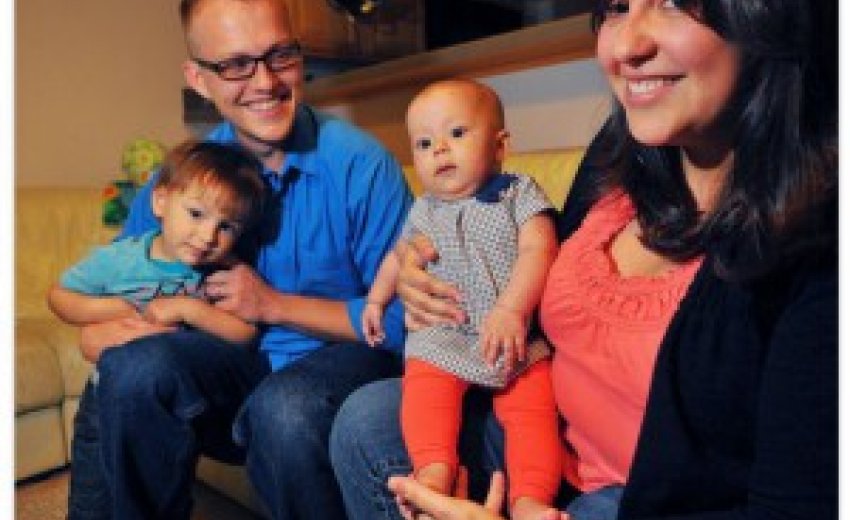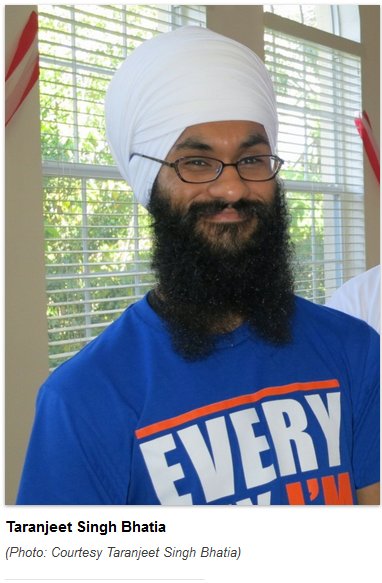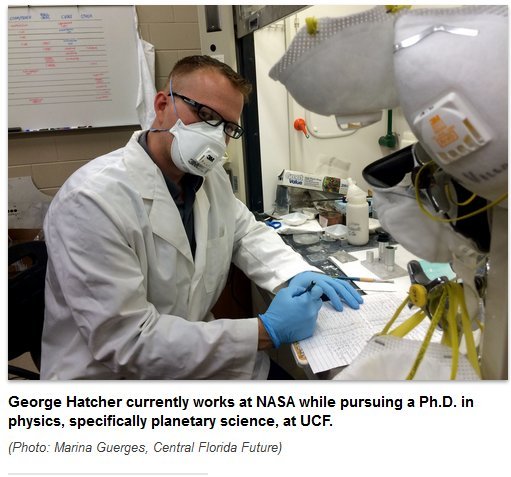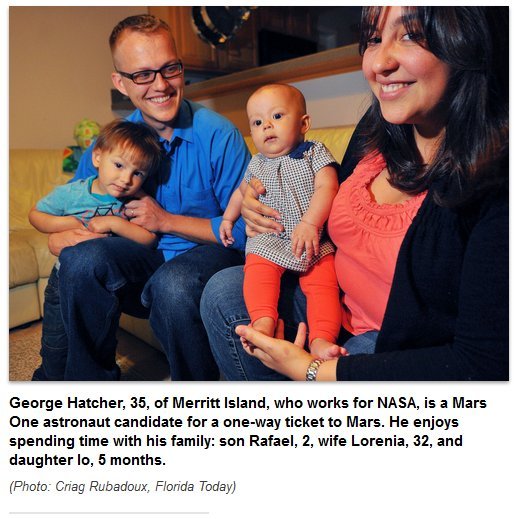|
A garage sale LEGO set consisting of a miniature astronaut with a white helmet and orange visor — that's what it took for George Hatcher, at the age of 3, to realize his love for space and desire to reach the Red Planet. |
|
Now, Mars One finalist and UCF student, Hatcher is one step closer to becoming one of the first humans on Mars. From a pool of more than 200,000 applicants, 100 people were selected to receive a one-way trip to Mars and possibly open doors for new scientific discovery. Two of those finalists are UCF students Taranjeet Singh Bhatia and Hatcher. Funded by a Dutch not-for-profit organization, Mars One aims to establish the first human settlement on Mars in 2025. The application process narrowed down 50 men and 50 women from all around the world: 39 from the Americas, 31 from Europe, 16 from Asia, seven from Africa and seven from Oceania. For the final 24 selected to travel, there's just one catch –– there won't be a return date back to Earthly civilization. Bhatia, 29, is working toward a Ph.D. in computer science and is in his fifth year of the degree program. In addition to his doctoral research, Bhatia is also working on human-robot interaction-based modeling and simulation in the field of social and cultural scenarios. It was always Bhatia's dream to become an astronaut. While reading technical papers for his research, he came across the Mars One mission to settle a human colony on Mars in the next decade.
Ambitious and excited about this mission, Bhatia believes that Mars One is dedicated to an international and inter-generational effort to take humans to Mars. "Who can even envision the incredible feeling of being the first human in history to step out of the capsule and leave your footprint on the surface of Mars? By this feeling, I submitted my application to this opportunity," he said. It may not be every day that a person realizes that he or she wants to travel to Mars and never come back to Earth. Bhatia is hopeful and committed to every step he is given to make his dream a reality. His family –– well, they might have some adjusting to get used to. "Like typical Indian parents, it's not easy to convince them when you go out of the ordinary," he said. "They were really mad at me initially, but now they realized it's a long way to go and many more selection rounds to come. My friends are really proud of this step and they are congratulating and encouraging me to achieve my dream." Although making the top 100 is a huge step for the aspiring astronauts, it's not a guarantee that they will make it to the final 24. "I will apply for it again and again and any other mission which brings my dream of becoming an astronaut closer. I will also consider moving toward space-related opportunities after degree completion," Bhatia said. Bhatia continues to focus on his studies while he waits for further details on the selection process to be supplied to him. "I am really excited about the mission and hope that it will see a day of successful human landing, even if I am not selected for the mission," he said. The Mars One top 100 finalists vary in the regions they are from, in areas of expertise, and even age. With ages ranging from 19 to 60, these finalists bring to the table different skills and experiences, but all share the same goal of becoming the first humans on Mars. For 35-year-old Hatcher, this mission means fulfilling a dream and goal he's had since first learning about space when he was only 3 –– it also means leaving behind his 2-year-old, 5-month-old and his wife. George Hatcher currently works at NASA while pursuing a Ph.D. in physics, specifically planetary science, at UCF. (Photo: Marina Guerges, Central Florida Future) "The one-way aspect is daunting, but I consider it the price of admission," Hatcher said.
Colwell, physics professor and assistant director of the Florida Space Institute, said he had no idea that Hatcher had even applied to the Mars One mission, let alone made it to the top 100, until he read it in the news. Colwell and Hatcher both shared the same dream of going to Mars in their youth years, but Colwell always wanted to actually come back to Earth. "I would love to visit Mars, but a one-way trip is not something that attracts me at all. Earth is the best planet I know of by far," Colwell said. Although there are people who won't agree or relate to the concept of dying on Mars, Hatcher always knew that space exploration was going to be a major goal in his life. At the age of 11, his parents enrolled him in space camp, where he got to be a pilot in a mock space shuttle. Hatcher got to meet people who were actually doing that as a job. In fact, he credits his parents for opening his eyes, at such a young age, to a passion that he has spent his life learning about. Leaving his children and wife behind will be an extremely difficult task for Hatcher. His wife, Lorenia, knew exactly what she was or will be getting herself into when she decided to have him put a ring on it.
As far as adjusting to her potential new lifestyle, Lorenia is not only supportive, but prepared for the journey. "It was never a huge surprise. It's not something that has been shocking or scary for me, and I don't think it has really changed much in how we live our day-to-day lives, except maybe having more of that awareness," she said. The entire experience has made Hatcher realize just how important life on Earth is and, if given the chance to go to Mars, he will cherish every waking moment he has left and –– with his belief in the Bahá'í Faith –– be reunited with his family in the afterlife. "In the spiritual aspect, unless I believed that there was life after the death of the physical body, I would not have applied for this program," Hatcher said. If not chosen, just like Bhatia, he will still be applying for other space missions and will take from this opportunity only a more positive mindset. "I would look forward to completing this Ph.D. and working as a scientist instead of an engineer, to contribute to the advancement of science … to raise my children to be contributing members of society and give the opportunities that my parents gave me," he said. ----- |

 "I was always fascinated about the idea of human space exploration, so the opportunity to be one of the people involved was really appealing," Bhatia said. "Getting people to Mars will be bigger than any single leap of exploration people of this planet ever taken."
"I was always fascinated about the idea of human space exploration, so the opportunity to be one of the people involved was really appealing," Bhatia said. "Getting people to Mars will be bigger than any single leap of exploration people of this planet ever taken." Hatcher is not only an active employee of NASA; he is also a Ph.D. student in the physics department and on the planetary science track at UCF, supervised by his adviser Dr. Joshua Colwell.
Hatcher is not only an active employee of NASA; he is also a Ph.D. student in the physics department and on the planetary science track at UCF, supervised by his adviser Dr. Joshua Colwell. "I was up front with her that this is a goal of mine and that I was willing to risk my life to go into space, because I was serious about space exploration and knew one-way was cheaper," Hatcher said. "She said, 'I'm OK with that as long as we have kids first.'"
"I was up front with her that this is a goal of mine and that I was willing to risk my life to go into space, because I was serious about space exploration and knew one-way was cheaper," Hatcher said. "She said, 'I'm OK with that as long as we have kids first.'"